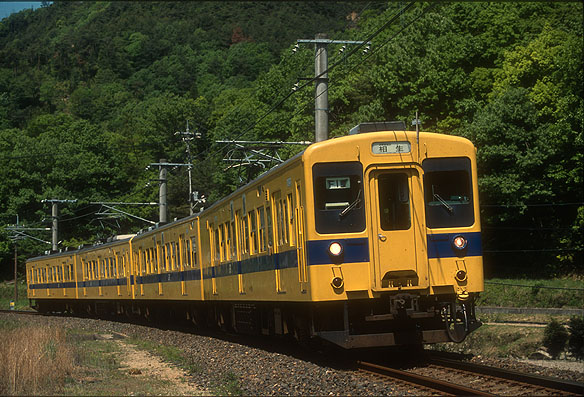In 1981, Japanese National Railways (JNR) developed 105-0 series DC electric
multiple unit (EMU) in order to replace early EMU types used on the rural
serivces of Fukuen, Ube, and Onoda lines. Low line speed of these lines
meant that 101 series or 103 series commuter EMU trains would have been
unnecessarily over-powered with their high proportion of motored cars,
so 105-0 series were designed with one motored car per two cars, adopting
the single unit system.
The vehicle design was closely based on the 201 series EMU, with the primary
difference in having three pairs of doors on each seide of the body, and
the cab design with the gangway. 105-0 series employ double-hang unit assembled
windows, destination indicator screens, and semi-automatic doors that can
be open manually to prevent the passenger's room from being cold in winter.
105-0 series are not equipped with air-conditioning and fitted with forced
ventilators on the roof.
Standard bogies DT33/TR212 for commuter EMU vehicles are adopted. Trailer bogies employ disc brakes to realize the good brake performance. 105-0 series adopt electromagnetic straight air brake. The rheostatic brake is available.
Four series-wound brushed DC traction motors, which same as those of 103
series, MT55A rated at 110 kW, are connected in series and controlled by
armature-resistance traction control system, CS51. The gear ratio is 6.07.
Type Moha105 and Kumoha105 vehicles are equipped with a diamond-shaped
current collector, PS16.
Seating is longitudinal throughout. The sets are not equipped with toilets.
Intermediate motored cars, Moha105, and intermediate trailer cars, Saha105, were modified with the addition of new cab ends and claasified into Kumoha105 and Kuha104 in 1984. All trailer end cars were later modified with the addition of toilets.
JNR fitted some vehicles with the concentrated air conditioner, AU75, and
JR West fitted the other vehicles with low-cost air conditioner, WAU202.
Moreover, the refurbishment was also commenced.
Although 105-0 series had been used on the rural services of Ube, Onoda,
Kure, Kabe, Hakubi, Ako and Kisei line, 105-0 series trains used on the
rural services of Kure and Kabe lines were displaced with 227-0 series
in 2016. Now 105-0 series are used on the rural services of Sakurai, Onoda
and Kisei lines. |
|





